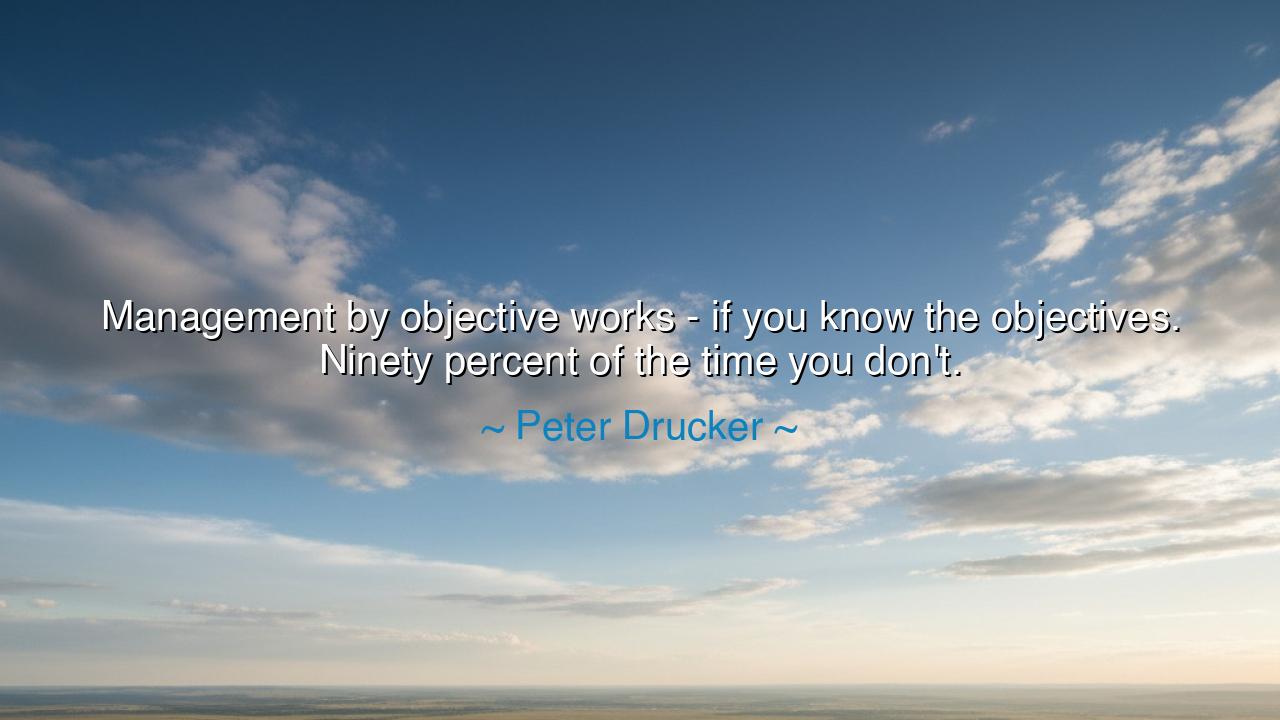
Management by objective works - if you know the objectives.
Management by objective works - if you know the objectives. Ninety percent of the time you don't.






The words of Peter Drucker, “Management by objective works—if you know the objectives. Ninety percent of the time you don’t,” pierce like an arrow into the heart of human endeavor. They reveal a paradox both humbling and urgent: that men and women often labor with great energy, discipline, and even brilliance, yet their efforts falter because their destination is unclear. This quote does not mock work, but unmasks its futility when purpose is forgotten. For no army, however strong, can win a war if it does not know which field it must capture.
The origin of these words lies in Drucker’s profound work as the father of modern management. He lived and wrote in an age when corporations were growing into giants, wielding power greater than nations. He observed that organizations sought systems, methods, and formulas to ensure success—chief among them, “management by objectives,” the practice of defining goals and measuring progress against them. Yet Drucker, with his characteristic clarity, reminded the world that this system is worthless without true knowledge of the objectives themselves. His words expose a simple but devastating truth: many leaders set forth without vision, chasing metrics instead of meaning, numbers instead of purpose.
The ancients would have nodded in recognition. Sun Tzu, in The Art of War, wrote that “tactics without strategy is the noise before defeat.” The general may organize his troops with precision, yet if he does not understand the true objective of the campaign, his victories are hollow and his efforts wasted. Drucker’s wisdom stands in this same tradition: efficiency without direction is not strength, but blindness. To march tirelessly in the wrong direction is worse than standing still.
History gives us vivid examples. Consider the Maginot Line of France before the Second World War. Built with immense resources and meticulous planning, it was a marvel of defensive engineering. Yet it served the wrong objective, for the German army simply bypassed it through Belgium. The French command had perfected their methods, but misunderstood their true goal: to defend the nation against invasion. Their failure was not in labor, but in clarity of vision. Drucker’s words could well have been spoken of them: management by objective works, if you know the objectives—but they did not.
The meaning of this teaching for us is profound. It is not enough to labor, nor to labor well. One must know why one labors, and to what end. Without clarity of objective, effort becomes scattered, projects collapse into confusion, and lives are wasted in busyness without fulfillment. The tragedy of humanity is not merely in failure, but in succeeding brilliantly at the wrong thing. Drucker’s warning calls us to awaken from this blindness, to ensure that our daily efforts are aligned with true purpose.
The lesson is clear: seek first clarity of purpose before mastery of method. Ask yourself: What am I striving for? What is the true objective of this task, this project, this life? Without such knowledge, even the best systems will lead astray. But with it, even imperfect methods may bear fruit, for a straight heart and a clear vision can guide faltering steps to their rightful destination.
Practical action lies within reach. Before beginning any labor, take time to define its objective. Strip away the distractions of numbers, deadlines, and appearances, and ask what true outcome you seek. In your work, clarify not only what you are doing, but why. In your life, reflect often on your ultimate aims: What legacy do you wish to leave? What good do you wish to build? With such clarity, every hour of labor becomes a step upon a meaningful path.
Thus, in the voice of the ancients, we proclaim: Blessed are those who know their objectives, for their labor shall not be in vain. Cursed are those who toil without direction, for their strength shall be spent like water in the sand. And let us remember always the wisdom of Peter Drucker: that management by objective works—but only if the objective itself is known, and known truly.






AAdministratorAdministrator
Welcome, honored guests. Please leave a comment, we will respond soon